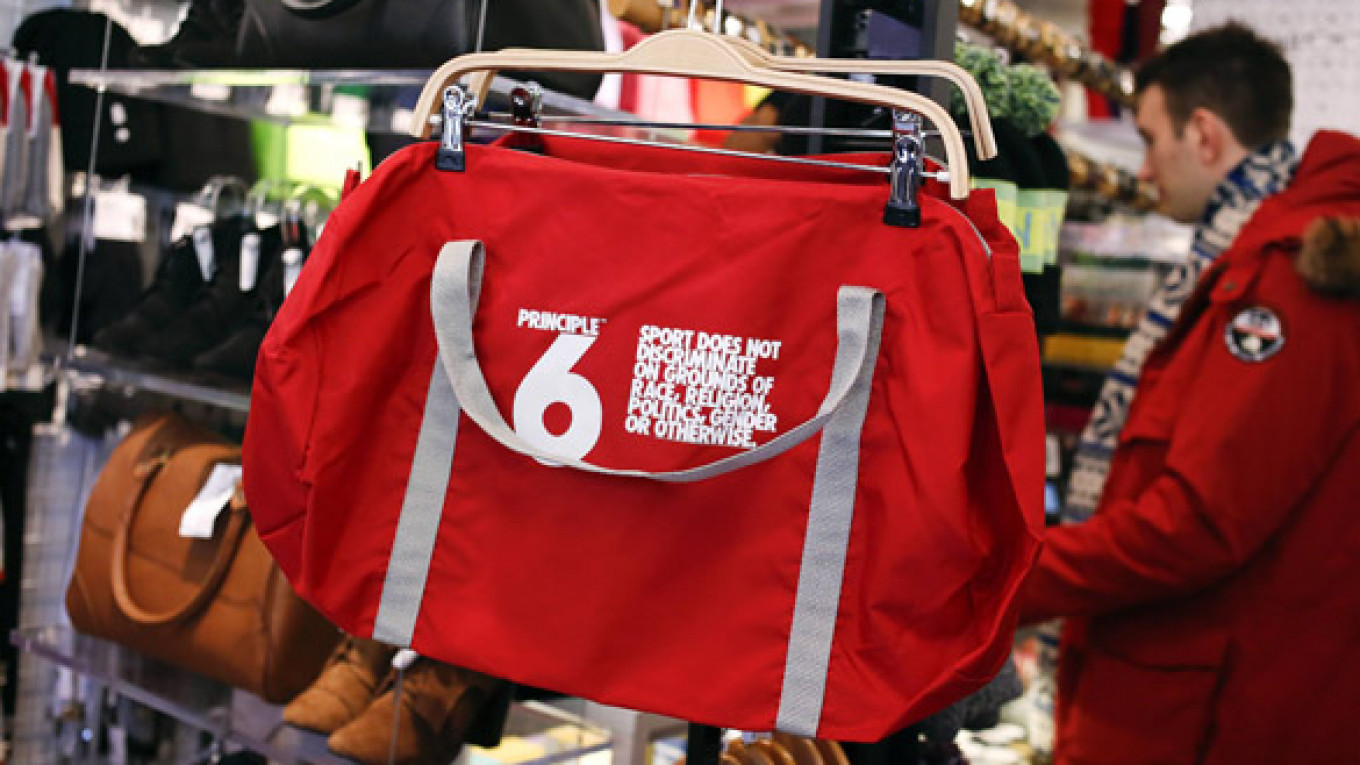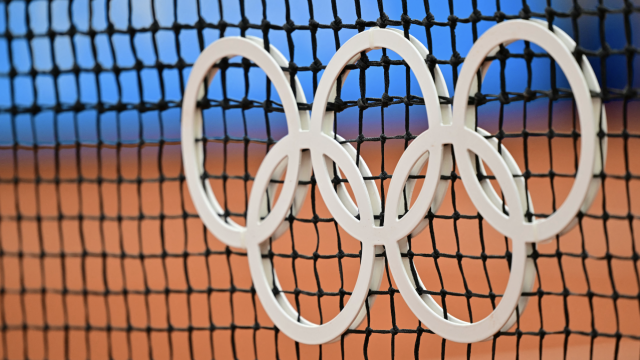LONDON — International gay rights campaigners are using branded clothing inspired by the Olympic movement's own values to show their opposition to Russian laws on homosexuality ahead of the Sochi Games.
American Apparel, known for its provocative marketing campaigns, is selling a line of bright red T-shirts, hoodies and hats based on Principle 6 from the Olympic charter, which spells out the movement's opposition to any form of discrimination.
Campaigners say the merchandise offers athletes a way of making a point about Russia's gay propaganda laws without falling foul of an International Olympic Committee ban on political protest during Games.
"This is an enormous opportunity to make a statement that will be heard around the world," said Hudson Taylor, founder of Athlete Ally, which fights against homophobia in sport.
"We have constructed a campaign that gives athletes the maximum ability to speak out with the minimum risk," he said.
Australian snowboarder Belle Brockhoff is one of the Sochi-bound athletes to model the clothing, and Canadian skier Mike Janyk has also backed the campaign.
Olympic host Russia has angered human rights activists with a law banning the promotion of homosexuality among minors. Critics say it is fostering a culture in which gays are persecuted, although President Vladimir Putin denies that Russia is "going after" gays.
"People can feel free and at ease but please leave the children in peace," he said during a visit to Sochi ahead of next month's Games.
Athlete Ally and gays rights group All Out had been promoting the Principle 6 campaign online before bringing in American Apparel as their merchandise partner.
"We thought their concept to reference the principles of the Olympic Charter was brilliant and gladly took on the challenge of turning the concept into a graphic element," said Iris Alonzo, creative director of the Los Angeles-based company, which has a history of brash and often-sexual marketing.
The merchandise is being sold in American Apparel shops and online. Alonzo said the Principle 6 T-shirt was the company's top selling new style online.
The IOC has strict rules in place to protect the rights of global sponsors including Coca-Cola and McDonald's, who help to fund the Winter and Summer Games.
Mindful of this, the Principle 6 merchandise does not refer directly to the Olympics or use its five rings logo.
Instead, the white print on its T-shirts reads: "Sport does not discriminate on grounds of race, religion, politics, gender or otherwise."
The IOC said it was aware of the campaign and did not regard it as violating its marketing rules. However, it did not rule out action against athletes who wore the merchandise in Sochi.
"As ever any judgment would ultimately revolve around how such clothing could be used during the Games itself," an IOC spokeswoman said.
Alonzo denied that American Apparel was using the issue to boost its brand.
"Many of our employees, friends and family identify as LGBT and we are proud to use our reach to call attention to important causes that concern their freedom," she said in an e-mailed statement.
Proceeds will be used to support the campaign and help lesbian, gay, bisexual and transgender (LGBT) groups in Russia.
All Out executive director Andre Banks said the 10 global Olympic sponsors should be sending out a stronger message to Russia and the IOC on gay rights.
"Sponsors like Coca-Cola are playing a very dangerous game," Banks said. "In the West they are building their brand on support for gays and lesbians but they are silent in other countries."
Soft drinks company Coca-Cola, a sponsor of the Olympics since 1928, said it did not condone intolerance of any kind.
"We support the core values of the Olympic Movement — excellence, friendship and respect — and are proud to continue our role in helping to make the Olympics a memorable experience for athletes, fans and communities all around the world," the company said in a statement.
A Message from The Moscow Times:
Dear readers,
We are facing unprecedented challenges. Russia's Prosecutor General's Office has designated The Moscow Times as an "undesirable" organization, criminalizing our work and putting our staff at risk of prosecution. This follows our earlier unjust labeling as a "foreign agent."
These actions are direct attempts to silence independent journalism in Russia. The authorities claim our work "discredits the decisions of the Russian leadership." We see things differently: we strive to provide accurate, unbiased reporting on Russia.
We, the journalists of The Moscow Times, refuse to be silenced. But to continue our work, we need your help.
Your support, no matter how small, makes a world of difference. If you can, please support us monthly starting from just $2. It's quick to set up, and every contribution makes a significant impact.
By supporting The Moscow Times, you're defending open, independent journalism in the face of repression. Thank you for standing with us.
Remind me later.







